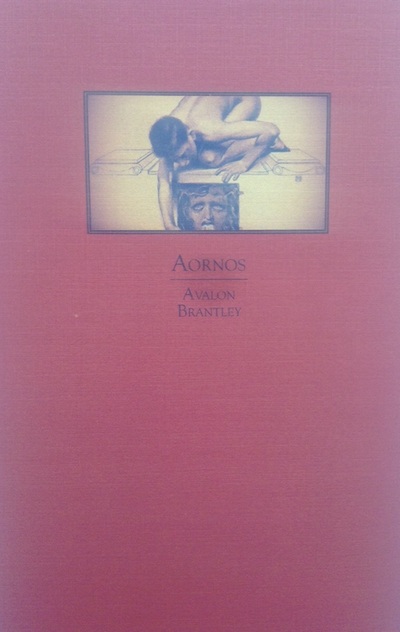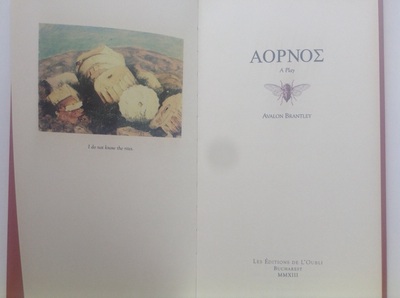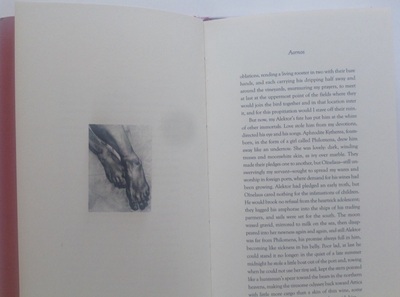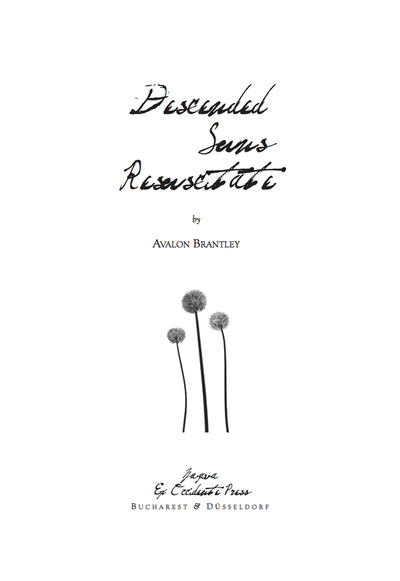|
Gigantic, infinite structures such as the Ocean or Cosmo, the History and the Myth remain equidistant, independent, although close. The density and complexity of these two forms hovering above the head of every human being, dead or alive, may suggest that it is a futile task to try and bring them together, or some imminent danger in the shock of both. But the ritual and fiction make this possible: Myth and History in a frame together, so that there are confluences, blends, collisions. The fierce and exquisite Avalon Brantley creations – Aornos, her new vision from the Greek Tragedy with Aristophanic irony as a design touch, the intrincated Descended Suns Resuscitate stories or the Fernando Pessoa tribute at the Dreams of Ourselves collection – at same time literature and ritual, detailed historiographical recovery and reconfiguration of personal mythologies, arises as a witness of the infinite, risky Myth and History Ars Combinatoria.
Your magnificent theater play – or perhaps narrative –, Aornos, has some resonance in Aristophanes The Frogs, something which is clear from the book epigraph (a quote from the great Greek comedy writer who serves as premonitory reference about your protagonist's name, Alektor), the theme of the descent to the dead underworld and the cicadas chorus that punctuates the plot as the chorus of frogs that accompanies the descent of Dionysus and Charon in The Frogs. Talk something about your refined work, a goldsmith labour, in the invocation of tragedy and comedy produced by Ancient Greeks. Well, I guess Aornos must be considered my first major publication, although it's by far not my first major composition. For me, however, it's definitely one of my most personally satisfying works. What surprises me about saying so is that I wrote the play in a week, when a story I had intended to include in what was meant to be my first major publication – the short story collection with Ex Occidente – instead was placed in another anthology. I wanted to fill this gap, but had nothing else I felt was fitting to include in that particular collection at the time, so I hurried through with my idea for Aornos. The seeds of that piece have in a vague way been at the back of my mind for years, though; I guess sometimes certain works mature in the mental cellars even more than their conceivers might realize until it's time to bring them to light. The Ancient Greek vision of the Underworld profoundly influenced Western literature and poetics, as well as many stages in Christian theology. For instance, there's nothing like it to be found in the Bible (Sheol and Gehenna are not the same as Hell) until the somewhat anomalous madness found in John's Revelations, and by then we're nearly a hundred years into the Christian era and referring to a book nearly discarded as apocrypha. So all the traditional visions of Hell used to terrorize sinners and Tantalise poets have tended to come at least in a greater part from pagan traditions. It's a large part of our literary heritage, and has fascinated me as a possible plane of creation for years; but I wanted to return to some of its cultural roots too, so I read a lot of comparative matter and siphoned through some out of the way materials both literary and academic, in order to work with some of the more gritty, obscure and forgotten aspects of Hades. Aristophanes is certainly a fascinating writer for me, in part because, despite that he is one of the earliest surviving satirists of the ancient world, he maintains deep reverence for certain sacred aspects of his own culture, such as the Eleusinian Mysteries (for which of course more modern critics were keen to criticize him). But in its place and context I actually find this quite a remarkable and endearing trait of his work and intention. As a student of history, I recognize exemples of unscrupulous and overly-imaginative writers whose works have hindered a reliable grasp of the past; yet, in the other hand, there are those who in a somewhat contra-rational way help to bring their readers into the key mindset of their time by this same wayward means, a context of the culture and its own dynamics and poetics, which dry history cannot do. Not only Aristophanes in this sense, but even moreso “historians” like Herodotus and Plutarch. I have very much enjoyed reading Thucydides (including his history of your namesake, Alcebiades) but his histories played no influential role in the construction of what is essentially, as I've described it elsewhere, a “mind-staged play”, a poetic rendering of the play structure perhaps, like (as you astutely pick up in your next question) Yeats' Purgatory. I did however find the history of Herodotus directly useful – for instance, the Bridge of Medea which Alektor strangely discovers in the midst of the waters whereon he has wandered comes straight from Herodotus. The point is that while Herodotus is one of our first “historians”, and Aristophanes one of our first “comedians” (at least in the sense of their subsequent influence; there were other, older writers of each kind) they both still help me to connect with a mindset long gone. I don't completely abjure the Age of Reason or Enlightenment as it were, but poetry and fantastic literature should demarcate a boundary beyond which the phantoms of so-called “reality” and reason grow misty and uncertain. The work of historians such as Thucydides or Gibbon will still be useful there too, but there the passive, intellectual process of reading for which these works were intended gives over to the dynamic, creative churnings of poetry and madness. At the final moments of Aornos – after the appearance of the extraordinary Stettix, a unique and fantastic character – becomes clear the early intuition that the reader may have noticed from the start of reading: your piece is practically non-representable. As in Ionesco Rhinoceros and Purgatory by William Butler Yeats, the scenery described in Aornos are better made by the imagination, the superior way to achieve the delicate and subtle games and images suggested by the words. Even the best set design built for a movie or a play would lose this suggestion effect. How you reached such imaginative and visionary synthesis? Is there any work that you face as a forerunner in this regard? As I couldn't help mentioning above, yes, the Imagination really is the ultimate theatre, or should be. In this age of movies chock-full of CGI, surround-sound effects, computer animation, hyper-realistic video games, all headed toward constant 3rd-party virtual reality, what I think is tragic is that part of our culture that is becoming so imaginatively lazy that it craves the crack rocks of spoon-fed media – immediate gratification of all the senses – from the outside! – which is powerful, yes, but it will allow the imagination we have brought with us since long before the dawn of literature, out of dreams and uncertainty at the vastness of this universe around us, to atrophy. So to answer your question, I would have to say that for me, the forerunner of this kind of imaginitive writing would have to be anything of a fantastic nature I read or had read to me as a child, when my undulled imagination played its part with alacrity, agility and brilliant vividness, so that I became so addicted to that aspect of reading and daydreaming that I craved it constantly. As an adult, in the empirical world, it does become progressively difficult; reading is harder work, like exercise becomes – you have to keep those muscles toned and joints limber. Not all written works readily lend themselves to this, but some will open up if approached in the right mindset, like a song you didn't care for at first but then begins to grow on you. For me, music is a very similar experience – there is an inexpressible magic in the fact that a series of patterned noises can cause entire worlds to explode into being behind closed eyes. Or just simply being in a place whose genius loci begins speaks to you, when certain special places can suddenly and inexplicably begin to whisper stories--images engendered in your head yet seemingly born straight out of stones and scents and sky. These things all have to come from the inside first, not some cinematographer's cutting room or programmer's code, but from inside the psyche itself. Or, if the opposite is true, one still has to keep the womb of Psyche ready to receive such transient gametes of inspiration. Both Aornos as the tales of Descended Suns Resuscitate worked an unusual cross between Myth, History, Daily Life and Fiction. In this sense, there is a thorough preoccupation with details, soon unfold in sophisticated language frames (the local argot, specific jargon, etc.) that evoke the past (even in their small detail everyday) while that assist in building complex narrative purposes: the irony and the mystery of the plot. What is the origin of their perception of these lines of contact between Myth and History? How to deal with the troubles related with this seemingly contradictory combination? But don't we live our lives in a seemingly contradictory universe? What perception is not at least in part a false perception, part of our contemporary mythologies? We still don't have a Grand Unified Theory of physics, and isn't there still so much that we have to admit on an epistemological and ontological basis is subjective? What fascinates me is how other cultures, without all our pintellectual taboos and inhibitions (or in this generation especially our technologized myopia), how those others might have interpreted the mystery that is being here, that is interacting with this powerful, cruel, incredible and mysterious universe. What I try to do (and perhaps it is a futile task from this vantage point (and yet poetically I don't believe that, even though intellectually I know that)) is to get into the mode of a character in a different time and place. At least, that's one of the aspects of my work that I'm most interested in concentrating on. Another time, place and culture, through the eyes that see within their belief systems, the way folk spoke, and how they lived their days, all these things would play a role in how phenomena are interpreted. These same limitations overhang us, as our children's children will all the better see, because we each can barely help interpreting the world through our own limitations and prejudices only, both personal and cultural. The reader must be somewhat out of place in the past, because just as L.P. Hartley said, “They do things differently there.” It is a different world than this. So I consider the past highly fertile ground for imaginative fiction. Also, poetically at least, I don't imagine time to be quite as strictly linear as we tend to perceive it here in our daily lives, keeping appointments and bedtimes. I try sometimes to mediate between (and amalgamate) our realities and the realities of somewhen else in a way that allows some inroad into the past but which also can maintain connections and perhaps strike sparks in the reader's frame of reference as well, a kind of literary deja-vu effect. Hence Alektor's response to the sudden apparition of Stettix arising before him out of the back of the boat is a line partly borrowed from the response of Lucifer when he encounters the monstrosity of Death in Milton's underworld. This for me again is poetic time going non-linear. Milton's words can come out of the mouth of a character set in Ancient Greece because they reached Milton's pen from out of a formless and timeless place whence the voice of his daemon (like a crouching toad perhaps?) hissed them into his ear. The Japanese writer Ueda Akinari in his book Tales of Moonlight and Rain – brilliantly adapted by the sensitive Kenji Mizoguchi in the movie Ugetsu Monogatari (1953) –, constantly works with deception, misleading cognitive perceptions that evolves from what we perceive as reality (which includes, of course, the supernatural). Many of your protagonists and characters hold this false perception of the universe around them. What would be your path to this poetic of deception, quite sophisticated in your narratives? The universe itself is a circular, loopy, tangled epic of unending deceptions. I guess my characters, just like us, have to gather up as many pieces of the puzzle as they can along the way, dropping some, mangling others, as they stagger toward whatever course on which they've set themselves. I wouldn't judge them all that much more deceived or mistaken than I (or may I venture, we?) must be, at least some of the way. Cognition, senses, perception – they are all just fallible approximative media anyway. But they're all we get so far, and despite the horrors, we sometimes catch glimpses of beauty here too. And then, when the horrors are beautiful...?! One of the Descended Suns Resuscitate tales that pleased me most was “The Last Sheaf”. In this plot there are many layers and paths: a curious and complex relationship between allegorical (peasants scything the crops, the conflicting notions of sacrifice and heroism), prosaic (a tourist trip of two students) and even caricatural or grotesque (the diary's pages, used to help in a serious case of diarrhea caused by the withdrawal of laudanum) purposes. The outcome brought to my mind the story “El Sur” (“The South”), the last of the Jorge Luis Borges collection Ficciones (1956). What procedures you employed in the construction of this (and other) tale(s)? Is there any usual method or each narrative has its own genesis and development? I think each narrative accumulates in its own way. Sometimes, as was the case with “The Last Sheaf”, a story will emerge directly from certain materials I am reading, sometimes while my eyes are on the page, sometimes after the book is closed, lights are out and eyes are closed... other stories seem to appear spontaneously from staring out of a window, listening to a song, visiting a new place.... There are constant fragments of stories, everywhere – in the ruins of an old house across a field that likely enough was once some long-departed somebody's dream home; in the faces of strangers walking past, or laughing or talking or seated in thought; in old clothes or photos, or objects in second-hand shops. Listening to these lurking stories is both an active/creative and (strangely) something of a passive process. It is work to craft a decisive cohesion to what are often only vague snatches or ideas, but in that process the strongest ideas sometimes begin to mature and develop somewhat on their own. Your stories discuss some civilization decline significant aspects: the apocalypses scales from the small to large ones, snapshots of decadence and exhaustion, voluntary and compulsory sacrifices. Two obvious examples in this sense: “The Way of Flames” and “Kali Yuga: This Dark and Present Age” in Descended Suns Resuscitate. So, perhaps it may be possible to say that your vision approaching that of James Joyce in Ulysses, about history as “a nightmare from Which I am trying to awake”. The decadence, in your narratives, was fed by philosophical reflections? Or your concern lies more significantly in the aesthetic field? Both in perhaps roughly equal measure, depending on the context. I have always been fascinated by the terrifying cyclicity of existence, of history, of human nature. The things we take for granted in developed countries are very fragile and have not tended to be the norm in most times and places. The preoccupations of decadent literature thus seem consistently à propos, and I expect will continue to be so recognized in an intermittent way, as the pendulum of history continues its wayward swaying... The music occupies, more obviously, a major space in the Aornos and the story “Hognissaga” narrative construction (although the same can be said of almost all your tales, since the musicality expands itself to the language’s core). What is your relationship with music in terms of your narrative building strategies? Is there any composer or style that is most suggestive in this regard? Again, it depends on the context (since each story develops in its own separate way) but there are times when music is the primary cofactor in the catalytic process by which a story develops itself. At other times, music might inject its own influences and ideas in ways I could never have predicted. I am extremely eclectic and enjoy a wide variety of musical styles, as well as recognize times when certain songs or styles I might generally find repugnant can in their own ironic way lend me helpful inspiration or insight. Considering that you published a dramatic narrative and short stories, it would be possible to forecast some of your future projects? Are you working on a more extensive narrative or even some visual and/or audiovisual creation, with all the powerful visionary inventiveness which is so remarkable in your stories? I have worked on a number of things which are at the moment unpublished, some of which may never be released for personal reasons (not all the writing I do is meant for publication; sometimes it just has to be done) and others I have yet to find a home. I tend to be remiss about submissions – it's my least favourite part of the entire process. I have written a full-length novel, a sort of triptychal response to William Hope Hodgson's House on the Borderland and his The Night Land. I also have both ideas and rudiments for several other projects, but right now I am working on something of a short novel, a very strange wide-ranging piece, set in different times and regions of Russia, though predominantly in the late 1930s during Stalin's Great Purge. When I have finally finished that piece (and I have no idea at the moment when exactly to expect that) there are several other areas I hope to begin to work in, probably as thematic short collections – one involving the Celtic peoples of the British Isles (a subject and setting with which I have already spent some time with the writing of my Hodgson homage), and another set in Colonial New England. Interview conducted with support from PNAP-R program, at the Fundação Biblioteca Nacional (FBN).
0 Comments
Leave a Reply. |
Alcebiades DinizArcana Bibliotheca Archives
January 2021
Categories
All
|




 RSS Feed
RSS Feed
